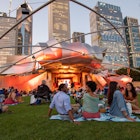
The 10 most wonderful places to visit in Washington State

Apr 1, 2024 • 8 min read

Washington State’s perennial highlights are its wild open spaces, ideal for kayaking, climbing, hiking and skiing © Thomas Barwick / Getty Images
Washington is a state of dramatic differences, both physical and cultural. The east mixes vineyards with stark landscapes scarred by past glacial activity, while the west is a patchwork of drippy evergreen forests, clinging to the skirts of snowy mountain ranges punctuated by dome-shaped volcanoes.
Seattle is a glorious combination of cultures and artistic movements, while oenophiles and farmers enrich the city of Walla Walla. Beyond the populated I-5 corridor, the state’s perennial highlights are its wild open spaces – ideal landscapes for kayaking, climbing, hiking and skiing. Roll up your sleeves, grab an oar, ice-ax or pole – these are the best places to visit in Washington.

1. Leavenworth
Best for Germanic culture
In the early 1960s, the town planners of Leavenworth took a potentially kitsch idea and made it into something wickedly authentic. Attempting to reverse a decline in the lumber industry that had threatened to put the struggling settlement out of business, they turned their small Central Washington town into a themed Bavarian village, complete with dirndl-wearing waitresses, a Nutcracker Museum and restaurants with names like München Haus plying beer and sausages.
Bavarian Leavenworth avoided overt Disneyfication and quickly became a big hit. The secret is in the details: gabled wooden houses with tidy flower boxes evoke the feel of a Romantische Strasse village, overlooked by a backdrop of pretty Alpine mountains; a Christmas lights festival draws in crowds from all over the state and beyond and enthusiastic locals parade their Teutonic leanings in well-presented food and lodging.
Planning tip: Book into the Enzian Inn and you’ll be entertained by the hardworking owner, clad in lederhosen and standing on the balcony, blowing on a giant alpenhorn over breakfast.
2. Walla Walla
Best for wine-tasting
If Washington has a Napa, this is it. The Walla Walla Valley and its eponymous town produce some of the best wine vintages in the US, with Syrah, merlot and cabernet currently drawing favorable comparisons with California.
Since the first winery was inaugurated here in the late 1970s, more than 120 establishments have opened in the area, many with tasting rooms spread around a downtown that's collected an array of fine-dining restaurants (and a bundle of awards for historical integrity too). Try Canoe Ridge for its merlot and cab sav and Saffron Mediterranean Kitchen for the subtly flavored pastas and steaks.
But wine doesn't have a monopoly on the local culture. Despite harboring a population of less than 34,000, Walla Walla has its own symphony orchestra (the oldest west of the Mississippi), an attractive college campus and a deluxe hotel listed on the National Register of Historic Places. It also gets less than half of Seattle’s annual rainfall.

3. Hoh Rainforest
Best for forested walks
Damp, mossy and surreal in an other-worldly Lord of the Rings kind of way, the Hoh is famous for its giant trees, substantial rainfall and multiple shades of green illuminating one of the finest tracts of old-growth forest in North America.
Encased in Olympic National Park and accessed via an 18-mile-long spur road that branches off Hwy 101 near the town of Forks, the forest is guarded by a museum-worthy visitor center, riverside campground and small network of trails. The pièce de résistance is the short but extravagantly wooded Hall of Moss Trail, where national park rangers lead guided walks in summer months.
Planning tip: Bring a waterproof jacket – they measure rainfall in feet rather than inches here.
4. Winthrop
Best for cross-country skiing
It’s 50 years since the struggling mining community of Winthrop rebranded itself as a grittily authentic Wild West town in an attempt to draw travelers from Hwy 20, which had just been built across the Cascades.
While the wooden frontier-style buildings generated approving nods, Winthrop has added plenty more weapons to its armory in the years since. There’s a museum to smoke-jumping (a heroic form of backcountry firefighting), a strong horse-riding culture, and copious trout- and salmon-fishing opportunities on the Methow River.
However, the number one attraction has to be Methow Trails, an extensive web of paths conceived and maintained by a local non-profit and the second-largest cross-country skiing network in the US. Snow or shine, a visit to the hilltop Sun Mountain Lodge just ten miles west of town is an essential ritual for a scenic hilltop brunch.
5. Paradise
Best for alpine hikes
On a clear day in late July, the above-the-treeline national park nexus of Paradise could quite conceivably make you think you’ve died and gone to heaven. Nestled on the southern slopes of Mt Rainier, flower-carpeted meadows are overlooked by the huge, glacier-encrusted dome of America’s finest stratovolcano, rising 2000ft higher than anything else in the Pacific Northwest.
Paradise is the hub for numerous trailheads, from the well-worn Skyline Trail to the starting point for edgy summit seekers. It also hosts the 1916-vintage Paradise Inn and the refurbished Henry M Jackson Visitor Center, where a modern museum dissects everything from alpine flora to the intricacies of glaciers.
Planning tip: Park naturalists lead free interpretive hikes from the visitor center daily in summer, and snowshoe walks on winter weekends.
6. Port Townsend
Best for history and architecture
Port Townsend, on the northeastern tip of the Olympic Peninsula, is the Seattle that wasn’t. An early front-runner in the race to be a cross-continental railway terminus, it ultimately lost out to the better-placed "Emerald City" and fell into a long decline alleviated only in the 1970s when locals recognized the value of the unkempt Victorian-era buildings and coaxed them back to life.
Today Port Townsend is one of the state’s most handsome historic towns, replete with creative restaurants, refined fin de siècle hotels and a curious calendar of year-round festivals where men in handlebar mustaches mingle with ladies in billowing dresses. Don’t leave town without taking in dinner at French-themed Finistère and a movie at the 115-year-old Rose Theatre, a revived cinema that has witnessed the transition from vaudeville through silent films, talkies and technicolor to digital.

7. Mt St Helens
Best for an outdoor geology lesson
The apocalyptic landscapes of Mt St Helens illustrate the damage wreaked by the famed 1980 volcanic eruption that prompted the largest landslide in recorded history. In all, 230 sq miles of forest were buried under 540 million tons of volcanic rock and ash, and 57 people lost their lives. When the smoke settled, St Helens had acquired a gaping mile-wide crater and lost a staggering 1300ft in height.
Encased in Mt St Helens National Volcanic Monument since 1982, the area today doesn’t enjoy the same level of protection as Washington’s three iconic national parks. However, there is an interesting array of visitor centers, viewpoints and learning centers dotted along the 52-mile approach road (Hwy 504) culminating in the Johnston Ridge Observatory that overlooks the 1980 blast zone. Between them, they document the devastation, post-eruption renewal and volcanic tracking being used to forecast future eruptions.

8. Stehekin
Best for peace and quiet
One of the few settlements in the US outside Alaska that’s disconnected from the main road network, Stehekin is located on the cusp of the North Cascade Mountains at the head of 50-mile-long Lake Chelan and is only accessible by boat or floatplane. Welcome to a splendidly isolated backcountry village (population 75) that only joined the Washington telephone system in 2007.
Getting to this remote spot is your first conundrum. You can arrive in Stehekin either by boat or floatplane across Lake Chelan or by a trio of long-distance hikes (minimum distance: 19 miles) through the wilderness of North Cascades National Park to the north.
This is prime fishing and horse-riding country. Stehekin Outfitters can organize mounts as well as tent-to-tent hiking, and Stehekin Valley Ranch is the best place to stay, while Stehekin Pastry Company is arguably worth the boat ride or hike alone.

9. Orcas Island
Best for families
There are three main San Juan Islands and more than 170 additional landfalls, islets and seagull perches in the complex archipelago that graces the Salish Sea just south of the Canadian border. If you’re struggling to choose one to visit, you can’t go wrong with Orcas, the largest of the islands by a smidgeon.
More precipitous than pastoral Lopez yet quieter than nearby San Juan, Orcas walks a fine line between rugged beauty and serviceable tourist facilities: there’s a strong locavore food culture and a handful of progressive restaurants led by the Inn at Ship Bay. The main hub, West Sound, is little more than a small village and amid the surrounding barns and pastures, you can still feel the pioneering spirit of the first European homesteaders who arrived in the 1860s.
Don’t leave the isle without hiking, cycling or even driving to the top of 2399ft Mt Constitution, relaxing by the pool at the gilded Rosario Resort & Spa and launching a kayak into the sheltered waters of Puget Sound.
Planning tip: The Inn at Ship Bay also offers accommodation but the dining room is shut during the winter season.
10. Fremont
Best for mavericks, nonconformists and free spirits
Seattle is less a rigidly unified city and more a confederation of eclectic neighborhoods, each with its own distinct personality. By far the most outlandish is Fremont, a wacky but self-deprecating enclave north of downtown that refers to itself as "the Center of the Universe" and colors its streets with a troll sculpture, an annual naked bike ride and a chocolate factory that would make Willy Wonka pine for a golden ticket.
Continue exploring Seattle's incredible neighborhoods with our insider's guide.
When you’re done perusing the junk shops, Bolshevik statues and dinosaur topiaries, Fremont also parades an abundance of microbreweries led by the perennially popular Fremont Brewing Company.
Take the next step in planning your trip to Washington
These road trips will take you to all the highlights in Washington
These tips will help you choose the best time to visit
These experiences won't cost you a thing
This article was first published Aug 9, 2022 and updated Apr 1, 2024.
Explore related stories

Beaches
Ultimate weekend on the Olympic Peninsula: enchanted forests, tide-pooling and Twilight encountersSep 23, 2024 • 7 min read




 Destination PracticalitiesEverything you need to know before visiting Washington State
Destination PracticalitiesEverything you need to know before visiting Washington StateMay 6, 2024 • 7 min read

 Destination PracticalitiesA first-timer's guide to Olympic National Park, Washington
Destination PracticalitiesA first-timer's guide to Olympic National Park, WashingtonApr 16, 2024 • 7 min read

 Festivals & EventsWhen to visit Washington State to enjoy the best of the Pacific Northwest
Festivals & EventsWhen to visit Washington State to enjoy the best of the Pacific NorthwestApr 3, 2024 • 9 min read
